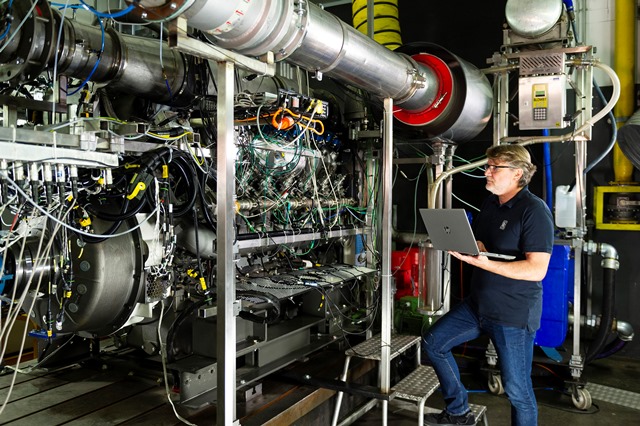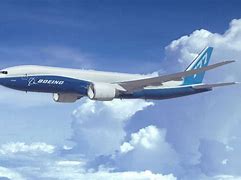Rolls-Royce fires world’s first hydrogen-powered thermal generation set
 Rolls-Royce has reached another milestone towards CO2-neutral energy supply: The further developed 12-cylinder gas engine of the mtu Series 4000 has successfully passed the first test runs with 100 percent hydrogen and showed very good results in terms of efficiency, power, emissions and combustion.
Rolls-Royce hat einen weiteren Meilenstein in Richtung CO2-neutrale Energieversorgung erreicht: Der weiterentwickelte 12-Zylinder-Gasmotor der mtu-Baureihe 4000 hat die ersten Testläufe mit 100 Prozent Wasserstoff erfolgreich durchlaufen und zeigte in Bezug auf Wirkungsgrad, Leistung, Emissionen und Verbrennung sehr gute Ergebnisse.
Rolls-Royce has reached another milestone towards CO2-neutral energy supply: The further developed 12-cylinder gas engine of the mtu Series 4000 has successfully passed the first test runs with 100 percent hydrogen and showed very good results in terms of efficiency, power, emissions and combustion.
Rolls-Royce hat einen weiteren Meilenstein in Richtung CO2-neutrale Energieversorgung erreicht: Der weiterentwickelte 12-Zylinder-Gasmotor der mtu-Baureihe 4000 hat die ersten Testläufe mit 100 Prozent Wasserstoff erfolgreich durchlaufen und zeigte in Bezug auf Wirkungsgrad, Leistung, Emissionen und Verbrennung sehr gute Ergebnisse.
Used in automobiles for a considerable period, and more recently, the aviation industry making its own bid to wean itself off fossil fuels, hydrogen as a source of fuel has for decades been associated, more with the quest for green mobility than static power generation and electrification. However, aircraft propulsion and power generation systems maker Rolls-Royce is set to change that.
Barely eight weeks since firing up a regional aircraft engine using hydrogen, the company claimed another first this week, after it successfully tested an mtu engine using pure hydrogen, a key step in the transition towards CO2-neutral energy supply as a fuel source.
The development signals a step-change for one of the world’s dirtiest industries and promises a green future for countries that depend almost entirely on thermal generation to meet their energy needs. Rolls-Royce said Janaury 16, that the 12-cylinder mtu Series 4000 L64 gas engine, had successfully passed major tests.
The tests were carried out by the Power Systems business unit and “showed very good characteristics in terms of efficiency, performance, emissions and combustion. These tests mark another important step towards the commercial introduction of hydrogen solutions to meet the demand of customers for more sustainable energy,” the company said.
“This engine will serve the market demand for hydrogen solutions in the energy transition and will be available to our customers as a reliable and clean power source for gensets and combined heat and power plants,” said Tobias Ostermaier, President – Stationary Power Solutions, Rolls-Royce business unit Power Systems.
- The first installation of mtu engines running on 100pc hydrogen is now planned for the enerPort II lighthouse project in the German inland port of Duisburg, as part of the development of a climate-neutral energy supply for a new container terminal.
“We see hydrogen as one of the central elements of the energy transition. It can be used for both storage of excess energy and as a fuel, not only for engines but fuel cells and cogeneration plants to generate climate-neutral electricity and heat,” says Dr Jörg Stratmann, CEO – Rolls-Royce Power Systems.
Rolls-Royce sees a future where surplus energy during off-peak demand on grids powered by renewable energy from wind or solar, could be channelled through an electrolyser to convert water to hydrogen, which can then later be used as fuel in any number of applications.
Rapid progress in efficiency, performance and clean combustion
For several months, the mtu gas engine has been undergoing bench testing and continuous improvement in terms of efficiency, performance, emissions and combustion using 100 percent hydrogen as fuel. With green hydrogen, these mtu engines can be operated in a CO2-neutral manner in the future. For gas engines already installed, Rolls-Royce offers a conversion solution.
“We are very pleased with the rapid progress. The very low engine emissions are well below the strict EU limits, no exhaust gas aftertreatment is required,” said a happy Andrea Prospero, an engineer at Rolls-Royce responsible for the development of the hydrogen engine.
Due to the different combustion behaviour of hydrogen compared to natural gas, some engine components including fuel injection, turbocharging, piston design and control, were modified in the test engine. However, by using proven technologies within the Power Systems’ portfolio, such as mtu turbochargers, injection valves, and engine electronics and control, the development of the engine to use hydrogen was advanced quickly and efficiently.
First deployment for CO2-neutral power supply at Duisport
Duisport, one of the world’s largest inland ports, is working with several partners to build a hydrogen-based supply network for its new terminal, ready for operation in 2024. In the future, most of the electricity required by the port itself will be generated directly on site from hydrogen in a CO2-neutral manner. This will be achieved by two combined heat and power plants with mtu Series 4000 hydrogen engines (with a total installed capacity of 2MW) as well as three mtu fuel cell systems (with a total installed capacity 1.5MW).
Rolls-Royce says as part of its sustainability program, it is realigning the product portfolio of Power Systems towards more sustainable fuels and new technologies that can further reduce greenhouse gas emissions.

 Brussels Airlines to announce Nairobi service
Brussels Airlines to announce Nairobi service
 SITA promises enhanced travel experience after Materna acquisition
SITA promises enhanced travel experience after Materna acquisition
 Saudia’s 105 aircraft order stretches A320neo lead over rival Max
Saudia’s 105 aircraft order stretches A320neo lead over rival Max
 Boeing refuses to pay hackers $200 million for stolen Data
Boeing refuses to pay hackers $200 million for stolen Data
 Uganda-Tanzania announce date for second joint business forum
Uganda-Tanzania announce date for second joint business forum
 Uganda Airlines leased A320 arrives in Entebbe
Uganda Airlines leased A320 arrives in Entebbe
